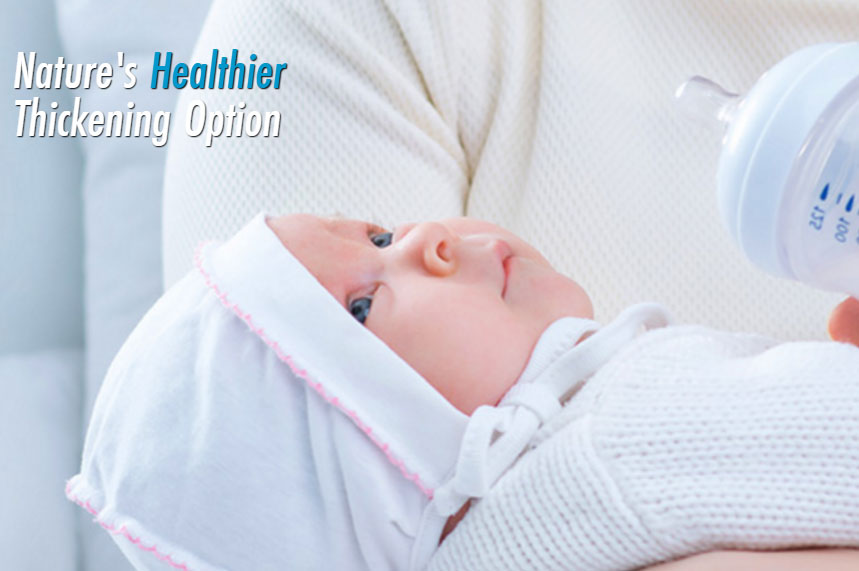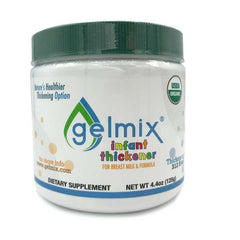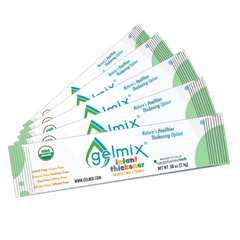WHAT IS CAROB BEAN GUM?
Carob Bean Gum (CBG), also known as Locust Bean Gum (LBG) is a galactomannan vegetable gum. A galactomannan is a type of saccharide typically used to stabilize food. The galactomannan vegetable gum is extracted from the seeds of the carob tree and it is used both as a thickening and gelling agent and is in the same family as fenugreek gum, guar gum, and tara gum, which are also typically used as food stabilizers.
These gums have widespread uses. In particular, CBG has been used in Europe as an infant milk thickener to address digestive and gastro issues since the 1950s.

WHAT IS IT USED FOR?
CBG and LBG is used to treat uncomplicated regurgitation of babies from birth onwards. It is safe for its intended therapeutic use on non-premature babies.
Studies find that neither CBG nor LBG is associated with any adverse toxic or nutritional effects in healthy term infants. There are, however, some limited case reports of possible adverse effects in premature babies that receive the thickener. Hence they are recommended only for babies born in healthy term.
A SAFE ADDITIVE
CBG/LBG are very safe food additives. Clinical studies demonstrated it has very low toxicity that result mainly from its indigestible nature. This leads to negligible systemic bioavailability and low, if any, effect on digestive tolerance. Bioavailability essentially means that it's unlikely to be absorbed by the body and there is a very low chance the gum will enter the circulatory system (bloodstream).

A LONG HISTORY OF USE
Carob Bean Gum and Locust Bean Gum has an extensive history of use as a food additive in general but also in various drug formulations. Studies testing their safety in consumption began as early as the 1950's. Some investigators studied the potential benefit of the indigestible polysaccharide gum derived from the Carob/Locust bean on infant diarrhoea and vomiting and reported zero negative effects (Beynon, 1949, Rivier, 1952 and Meunier et al., 2014). The test group consisted of newborns and young infants.
Additional studies have found that formula thickened with Carob/Locust Bean Gum reduces the number of regurgitations (Miyazawa et al., 2007 and Wenzl et al., 2003).
A SAFE COMMERCIAL THICKENER FOR OVER 20 YEARS
The first published investigations and trials conducted either with CBG/LBG as a thickener or as commercialized CBG/LBG-thickened formula dates back more than 20 years (Greally et al., 1992 and Vandenplas et al., 1994). Since that time, CBG/LBG-thickened formula has been continuously present on the market and given to an extensive number of infants to treat regurgitation without any reported adverse health effects or concerns.
HOW MUCH CAROB BEAN POWDER IS SAFE FOR INFANTS?
Generally, a standard therapeutic level of 1.2g - 2.4g (1/2 tsp - 1 tsp) powder per 120 ml (4 oz) infant formula or breast milk is shown to provide relief of gastroesophageal reflux (GER) issues for your baby with no adverse side effects. GER is also commonly known as acid reflux or acid regurgitation.

RECOMMENDED USE
Based on clinical practice and the recommendations of paediatric societies, the use of CBG/LBG-thickened formula and breast milk should only be used to treat uncomplicated GER for healthy term infants, who are over 42 weeks gestational age and weigh 6 pounds or more.
WHERE TO BUY CAROB BEAN THICKENER
Gelmix is a natural thickening powder that uses organic carob bean gum as the thickenering agent. It is the first and only USDA certified organic thickener specifically formulated for pediatric use in America, and is considered safe for infants over 42 weeks gestational age.
Buy online from Caring Solutions in Canada.



